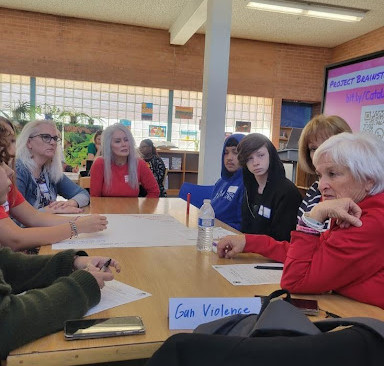Reflections on the past, present, and future of assessment for learning
By Jenny Poon

We are pleased to share with you today a piece from our storytelling series of reflections and noticings coming out of our convening in Tucson!
Please stay tuned for more writings from our team of storytellers and revisit the blog here to see them all in the coming months.

At the center of the emblem representing Tucson Unified School District’s department for Culturally Responsive Pedagogy and Instruction (CRPI), a mythical bird turns backward to retrieve an egg (Fig 1).
Called Sankofa, the bird – a Bono Adinkra symbol originating in Ghana – represents retrieving things of value from our knowledge of the past.
Sankofa is often associated with the Akan proverb, “Se wo were fi na wosan kofa a yenkyiri," which translates to, “It is not wrong to go back for what you forgot (or left behind).”
As I reflect on my three days in Tucson, AZ for the 2023 Assessment for Learning (AfL) convening, the concept of Sankofa reverberates through three distinct, yet interconnected, stories. The first is about a district’s effort to restore indigenous epistemologies. The second is about a teacher restoring a pedagogical practice that was once vibrant but since forgotten. The third is about my own reckoning with feelings of “assessment for learning” de ja vu.
Returning to epistemologies left behind
This first part is about what Sankofa represents to the CRPI department. As CRPI Director Lorenzo Lopez shared in opening remarks at the convening, the symbol is combined with images of Teocalli, temples of the Aztecs and other Mexican peoples that represent places of learning. Together, they represent a retrieval of cultural heritage and indigenous epistemologies – “ways of knowing” – that were discarded by colonialist educators.
For example, CRPI’s Mexican American Studies courses are built around indigenous knowledge codified in Aztec mythology (Fig 2). Such as Quetzalcoatl, a feathered serpent representing the stability, direction, and purpose that come from one’s knowledge of cultural identity and collective history. And Tezcatlipoca, a smoking mirror representing the self-reflection necessary to reconcile the past with the possibilities of the future.

These and other indigenous concepts come to life through CRPI’s Mexican American Studies and African American Studies programs. As Alexandro “Salo” Escamilla writes in this post, schools like Wakefield Middle School embed them in curriculum, pedagogy, ritual, and celebration. In doing so, Tucson students, teachers and leaders reclaim cultural identities as sources of strength and pride.
But do not confuse this work with the feel-good multicultural fairs or cultural awareness months that are more typical in American schools. Yes, they celebrate identity and cultural heritage, but the indigenous epistemologies driving Tucson’s Culturally Responsive courses also challenge and expand traditional notions of “student success.” Los Cuatro Tezcatlipocas teach us that success is not a student who is knowledgeable. The real goal is in guiding students to become “mature human beings” who are in harmony with themselves and the world around them.
That seems like something worth holding on to.
Returning to pedagogies left behind
Sankofa took on a second meaning at the AfL convening when I witnessed a Tucson teacher discovering the buried lineage of her pedagogical practice that, once realized, has the power to change everything.
We were sitting in a small conference room at the convening hotel. I and a group of AfL participants gathered with Teresa Sena, a veteran English and World History teacher at Tucson’s Catalina High School. She and her national collaborator, Moneka Stevens from Future Focused Education, were preparing us for the “learning excursion” they had designed for us to experience AfL practices in real time, in Sena’s real classroom.
Sena’s students had just launched their Youth Participatory Action Research (YPAR) projects, a pedagogical practice that Sena had brought over from her previous school. The students each selected a topic that impacted themselves or their communities, such as gun violence, substance abuse, mental health, immigration – even school dress code policies. Individually or in small groups, they conducted background research on their topics and were preparing research projects to first understand the root causes of their issue, then design an intervention that they themselves could take to help address it. We were preparing to enter this process through a World Café event designed to connect students with us and other local community partners to discuss and receive feedback on their project designs.

Sena is deeply passionate about YPAR. She believes students deserve learning experiences that are relevant and meaningful to them. She praises her students for demonstrating agency and driving their projects on their own, joking that she’s a mere accessory in the room. She wants more teachers to share her passion and hopes that Catalina will one day become a YPAR magnet.
But right now, she’s running YPAR alone, on top of her other curricular commitments as an English or World History teacher. As far as she knows, she’s one of the few teachers in the entire district doing YPAR.
But this year, with the help of Stevens, she is excited to expand her practice to include community partners through today’s World Café. She said she is hopeful that many of them will stay on to support students’ YPAR projects in ongoing ways.
Josh Schachter also happened to be in the room with us. Schachter runs the Tucson-based nonprofit CommunityShare, a “human library” connecting PK-12 students and teachers with local community partners in order to boost the relevance of students’ learning experiences and grow their social capital. His organization is perfectly poised to facilitate the very connections that Sena and Stevens want to take YPAR to the next level.
Schachter shared that, as it happens, he created CommunityShare after his own experience co-leading YPAR with ELL teacher Julie Kasper at a Tucson high school. He learned that the relationships students formed with community partners through their YPAR projects were valuable, but they were too dependent on his own social capital. When he left the school, most of that social capital left with him. So, he developed CommunityShare to create a more decentralized and resilient infrastructure that any student, teacher, or community partner can tap into.
But here’s the kicker. That school Schachter left? It was Catalina High School. And Sena, like the rest of us, had no idea that the school had any history of YPAR, until then.
Schachter and Kasper’s pioneering practice may not have endured at Catalina, but what’s important is that their legacy is not forgotten. Sena now carries it forward, connecting the dots between past and present. More: she now has access to the resource (like Sankofa’s “egg”), CommunityShare, that was forged from Schachter’s own past.
We glimpsed only the beginning of what might be the story’s next chapter. The next day, we participated in the World Café along with several community partners. We traded ideas and insights with the students. We traded contact information with Sena.
It remains to be seen whether those community partners will become ongoing mentors for Sena’s students, and whether Schachter’s platform might bring more partners to the table.
But the potential is there. The things of value from the past have not been lost.
Students interacting with Assessment for Learning convening participants and Tucson community partners during the YPAR World Café event at Catalina High School.
Persisting in what we’ve known
On a personal level, the symbol of Sankofa speaks to a feeling that had been nagging me from the start of the AfL convening. We’ve been here before.
Indeed, it’s hard to say that any of the conference’s key messages were particularly new or revelatory. The term “formative assessment” surfaced in academia in 1967 to describe “on-going evaluation” for the purpose of improvement, distinguishing it from more “summative” evaluations. Since then, researchers like Benjamin Bloom, Paul Black, Dylan Wiliam, and Margaret Heritage (among many others) have spent decades making the case for formative assessment (also known as “assessment for learning”) practices, such as eliciting evidence of where learners are in their learning; establishing where they’re going and a clear understanding of what success would look like; providing ongoing, in-real-time feedback that moves learners forward; and activating learner agency through shared goal-setting, co-regulation, and assessment of their own progress.
We also already know from the science of learning and development that physical, emotional, and social safety impacts learning; that valuing one’s culture, identity, and lived experiences impacts learning; and that strong, positive relationships can open up learning and impact cognition on a cellular level.
And that’s just what the academics have agreed on. One could rightly argue that teachers, mentors, coaches, families, and caregivers have known many of these things since the dawn of time. Schachter knows this, and built CommunityShare to support the kind of hands-on informal learning that predated modern schooling – a time when “young people learned with and from caring adults and elders in their community.”
So why are we here at the AfL conference in Tucson? Why do we need a national conference to spread the word about AfL practices that researchers have “proven” and that seem so obvious to the rest of us?
I believe the answer lies in what American education, as a system, prioritizes and constrains us to pursue. It is not “assessment for learning.”
As a current system, American education does not prioritize nurturing “mature human beings” who are in harmony with themselves and the world around them, like the Los Cuatro Tezcatlipocas suggests. It gives little space or support for community-embedded, student-driven field work relevant to students’ identities and passions, like in Sena’s YPAR projects. It crowds out so many of the things that our teachers, mentors, coaches, families, caregivers – heck, even the researchers – know are important not just to cognition but to human thriving.
So for me, Sankofa inspires persistence. It is not wrong that we’re still here holding the banner for assessment for learning. We are holding on to the things of value amidst relentless demands to uphold something else. We are also sharpening our understanding of those things – and giving and sharing feedback on those things – as each of us moves forward on our own formative journeys as educators and system-builders.
No, it is not taboo to hold on to the wisdom of the past.
It is necessary.
About the Storyteller

Jennifer Poon’s mission is to affect social justice by transforming the public education system to be more responsive to the needs of all learners, especially those most historically under-served. She currently serves as Partner for Learning Design and Sense-making with the Center for Innovation in Education. She lives with her husband and daughters in New York. Tweet to her @JDPoon.










Comments